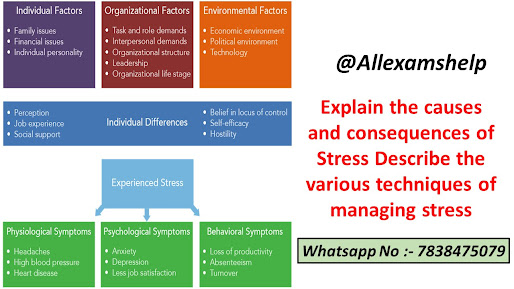Stock market speculation: The stock market speculation of the 1920s led to overproduction and an unsustainable rise in stock prices. When the stock market crashed in 1929, many investors lost their savings.
Bank failures:
Banks invested heavily in the stock market and suffered losses when stock
prices crashed. The failure of many banks led to a lack of confidence in the
banking system, and many people withdrew their savings, further exacerbating
the crisis.
Explain the causes and
consequences of stress Describe the various techniques of managing stress
Agricultural
overproduction: The agriculture sector was also overproducing, and prices for
farm products fell significantly. This caused financial difficulties for
farmers and reduced their ability to buy goods, contributing to the economic
downturn.
Unemployment:
The Great Depression led to widespread job losses and high unemployment rates.
Millions of people were unable to find work, and poverty and homelessness
became widespread.
Reduction in
economic activity: The depression led to a significant reduction in economic
activity, with decreases in industrial production, international trade, and
investment.
Political
instability: The depression led to political instability in many countries,
with the rise of fascist and communist regimes in Europe, and the New Deal
policies in the United States.
For SOLVED PDF & Handwritten
WhatsApp No :- 7838475019
Psychological
impact: The Great Depression had a profound psychological impact on people,
causing widespread feelings of hopelessness, despair, and helplessness.
The Great
Depression had a lasting impact on the global economy and shaped economic
policies and practices for decades to come. It remains one of the most
significant events in modern economic history and serves as a reminder of the
importance of stability and regulation in the financial system.
Stress is a
normal psychological and physiological response to demanding circumstances. It
is a common experience that arises when a person perceives that demands exceed
their personal and social resources.
Causes
of stress:
1.
Work-related stress: Long hours, high workload, job
insecurity, and work-life imbalance are common causes of work-related stress.
2.
Family and relationship stress: Conflicts with family
members, divorce, and relationship problems can lead to stress.
3.
Financial stress: Money problems, such as living
paycheck to paycheck, and the fear of not being able to pay bills, can be a
significant source of stress.
4.
Health-related stress: Chronic illness, injury, or
disabilities can create stress.
5.
Environmental stress: Natural disasters, traffic,
noise, and pollution can also be sources of stress.
Consequences
of stress:
1.
Physical consequences: Stress can lead to headaches,
fatigue, muscle tension, and stomach problems. Over time, it can increase the
risk of developing heart disease, stroke, and other serious health problems.
2.
Emotional consequences: Stress can lead to anxiety,
depression, irritability, and mood swings. It can also lead to a decreased
ability to cope with challenges and increased feelings of hopelessness.
3.
Cognitive consequences: Stress can affect memory,
attention, and decision-making abilities. It can also lead to decreased
motivation and productivity.
Techniques
for managing stress:
1.
Exercise: Regular physical activity can reduce stress
and improve physical and mental well-being.
2.
Relaxation techniques: Deep breathing, meditation, and
yoga can help to calm the mind and reduce stress.
3.
Time management: Prioritizing tasks and setting realistic
goals can help reduce stress by reducing the feeling of being overwhelmed.
4.
Social support: Spending time with friends and family,
and seeking support from loved ones, can reduce stress and improve emotional
well-being.
5.
Healthy lifestyle: Eating a balanced diet, getting
enough sleep, and avoiding unhealthy habits, such as smoking and excessive
alcohol consumption, can reduce stress and improve overall health.
6.
Cognitive-behavioral therapy (CBT): CBT can help
individuals identify and change negative thought patterns and behaviors that
contribute to stress.
Remember, stress management is a ongoing process, and what works for one person may not work for another. It's important to experiment with different techniques and find what works best for you.
